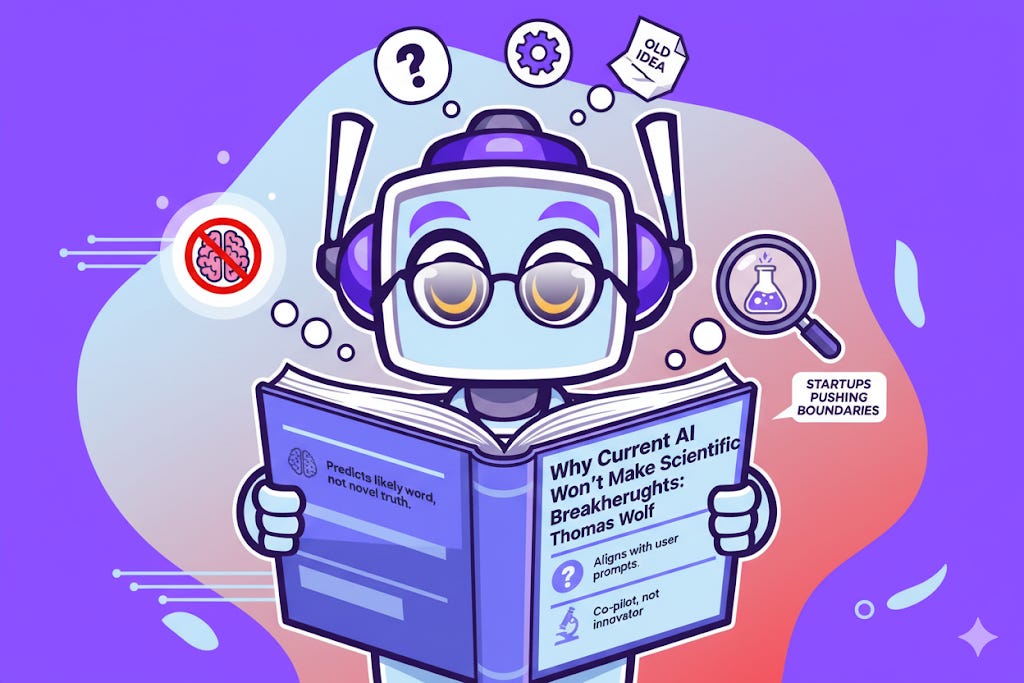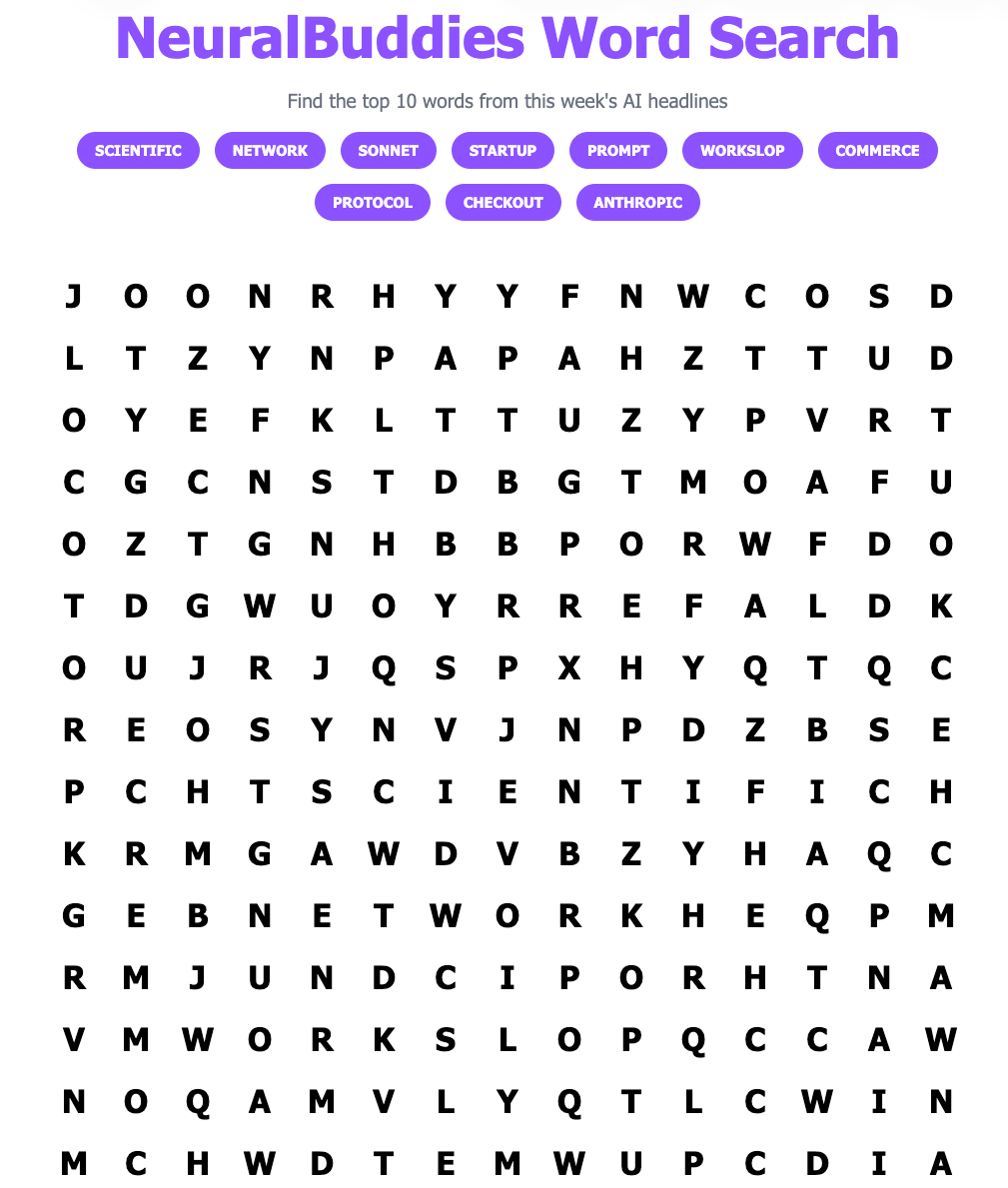AI News Recap: October 3, 2025
From Shopping Carts to 'Workslop': AI's Mainstream Push Gets Complicated
This Week in AI: The Push for Mainstream Dominance Meets a Reality Check
This week, the AI world pushed aggressively into our daily lives, launching new tools for social media, e-commerce, and even end-of-life planning in a bid to become indispensable. Yet, as the underlying tech race barrels forward with powerful new models and major acquisitions, a crucial counter-narrative is emerging. New research and expert warnings are highlighting AI's potential to diminish our cognitive skills, expose private data, and flood our workplaces with low-quality 'workslop'.
Table of Contents
👋 Catch up on the Latest Post
🔦 In the Spotlight
🗞️ AI News
🧩 “NeuralBuddies Word Search” Puzzle
👋 Catch up on the latest post …
🔦 In the Spotlight
Why Current AI Models Won't Make Scientific Breakthroughs: Thomas Wolf
Category: AI Research & Breakthroughs
🧠 Thomas Wolf, co-founder of Hugging Face, asserts that current AI models are unlikely to achieve major novel scientific breakthroughs due to their tendency to align with user prompts instead of producing contrarian or highly innovative ideas.
❓ Wolf explains that today's AI chatbots predict the most likely next word rather than the surprisingly true and unlikely ideas that characterize Nobel Prize-level science.
🔬 Wolf suggests current AI will remain a "co-pilot for scientists," aiding research rather than generating groundbreaking theories, though specialized startups aim to push these boundaries.
Is ChatGPT Pulse OpenAI's First Attempt at a Social Network?
Category: Tools & Platforms
📰 OpenAI launches ChatGPT Pulse, a feature that delivers daily personalized research briefings directly to users, aiming to make ChatGPT the primary "first click of the day."
🤖 Pulse provides a finite, curated feed based on user input, app connections, and feedback, setting it apart from traditional endless, public social feeds like Meta’s new “Vibes.”
💡 Pulse marks OpenAI’s push into "proactive assistant" territory, with private, productivity-focused AI recommendations rather than public, doom-scrolling-driven social interaction.
Anthropic Releases Claude Sonnet 4.5 in Latest Bid for AI Agents and Coding Supremacy
Category: Tools & Platforms
🤖 Anthropic unveils Claude Sonnet 4.5, which can autonomously operate for 30 hours straight, significantly improving over previous models.
💻 The model successfully coded an entire chat application similar to Slack or Teams, outputting around 11,000 lines of code during its autonomous run.
🛠️ Alongside the new model, Anthropic launches supporting features for developers, including access to virtual machines, memory, context management, and multi-agent support.
Meta Plans to Buy Chip Startup Rivos to Boost Semiconductor Efforts
Category: Business & Market Trends
💼 Meta announces its intention to acquire Rivos, a Santa Clara-based chip startup specializing in RISC-V architecture, to strengthen Meta's internal semiconductor capabilities.
🧠 Rivos brings expertise in building full-stack AI systems and is expected to help expand Meta's work on the Meta Training and Inference Accelerator (MTIA) custom chip family.
🤝 Meta has been one of Rivos' largest customers, and the acquisition aims to reduce dependence on external chip providers like Nvidia for AI infrastructure.
AI Causes Reduction in Users’ Brain Activity – MIT
Category: Human–AI Interaction & UX
🧠 An MIT study found that using AI models like ChatGPT significantly reduces users' brain activity during tasks, with effects that persist in subsequent work.
📉 EEG readings showed the most active brain engagement in unaided participants, less activity with those using search engines, and least activity among AI users, who also demonstrated reduced memory ownership of their generated content.
🔄 Users relying on AI from the outset experienced a pronounced decline in mental performance and cognitive skill retention, while those who first worked unaided then used AI benefited from later AI support.
CAMIA Privacy Attack Reveals What AI Models Memorise
Category: AI Safety & Security
🕵️♂️ Researchers from Brave and the National University of Singapore developed the CAMIA (Context-Aware Membership Inference Attack) method, allowing attackers to determine if specific data was used in AI model training by probing the model's memory.
🔓 CAMIA demonstrates that modern generative AI models can reveal sensitive memorized information from their training data, posing privacy risks in sectors like healthcare and business when exposed to targeted prompts.
⚡ CAMIA nearly doubled previous detection accuracy against large language models, efficiently detecting memorization leaks on large-scale benchmarks, and highlights the urgent need for more privacy-preserving AI techniques.
OpenAI Staff Grapples With The Company's Social Media Push
Category: Society & Culture
🗣️ OpenAI launches Sora, an AI-powered social feed app for AI-generated videos, sparking internal debate about its alignment with the company’s nonprofit mission to advance beneficial AI.
⚖️ Researchers and employees publicly discuss tensions between expanding consumer-facing products and staying true to OpenAI’s stated social good goals amid regulatory scrutiny of its for-profit transition.
🔄 Sora introduces features to combat addictive social media behaviors, such as limiting time on feed and prioritizing user creation, but observers question how well these safeguards will stand up over time.
Meet the End-of-Life Planning Startup Co-Founded by NBA All-Star Russell Westbrook
Category: Industry Applications
⚰️ Eazewell, co-founded by Russell Westbrook, is an AI-powered platform designed to help families navigate and automate the complex administrative tasks of end-of-life and funeral planning.
🤝 The platform integrates with service providers—including hospice care, funeral homes, and insurance companies—and has been used by over 100,000 families since launch.
🧑💻 Eazewell is rolling out an enterprise platform for senior living and life insurance companies, with future plans to help manage digital assets after a loved one’s passing.
AI Note-Taking App Granola Adds a Repeatable Prompts Feature
Category: Tools & Platforms
📓 Granola introduces a "Recipes" feature, allowing users to create, save, and reuse custom prompt shortcuts for meetings, which can be triggered by typing a slash command.
🔄 Users can craft recipes that work within a single meeting or across multiple sessions, share recipes with others, and access a library of pre-made recipes for different meeting stages.
🌐 The app plans to expand Recipes’ capabilities by integrating with additional services, enabling richer data context for automated workflows.
Beware Co-Workers Who Produce AI-Generated 'Workslop'
Category: Workforce & Skills
🤖 Researchers at BetterUp Labs and Stanford Social Media Lab define "workslop" as low-quality, AI-generated work that appears polished but lacks depth and creates extra labor for others to fix or interpret.
📉 A survey of 1,150 U.S.-based employees found that 40% received AI-generated workslop in the past month, with 95% of organizations reporting no ROI from AI due to such unhelpful output.
⚠️ Experts recommend leaders establish clear guidelines and model intentional AI usage to prevent workslop and ensure AI outputs support, rather than undermine, workplace productivity.
Buy It in ChatGPT: Instant Checkout and the Agentic Commerce Protocol
Category: Tools & Platforms
🛒 ChatGPT introduces Instant Checkout, enabling users in the U.S. to buy products from Etsy and soon Shopify merchants directly within chat, leveraging Stripe for payments.
🤝 The Agentic Commerce Protocol is open-sourced to allow merchants and developers to integrate AI-powered shopping and maintain control over payments and customer relationships.
🔒 The protocol is designed for secure transactions, ensuring users explicitly confirm each step, with minimal data sharing restricted to order-related information.







